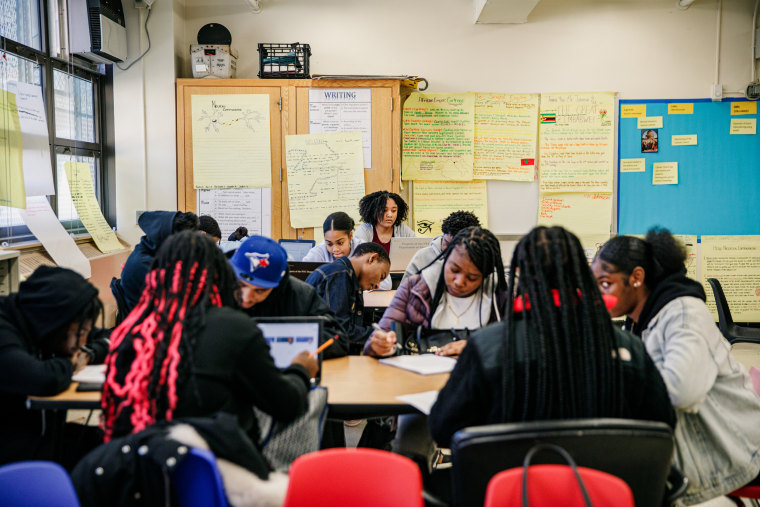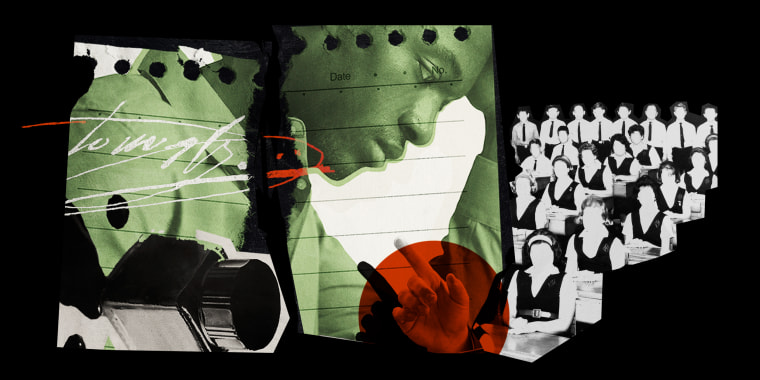The mere existence of the high school Advanced Placement course in African American Studies has become a political wedge. It was created for two primary reasons: to legitimize Black history as a necessary subject matter in American schools and to reverse the underrepresentation of Black students in AP courses.
Instead, in some states, the course has wandered into the crosshairs of a culture war intent on banning all forms of race-conscious and inclusive education. The College Board, which provides these advanced courses for the country’s intellectually gifted high schoolers, has deemed African American Studies not only as worth studying, but also as a gateway to educational advancement. That point, however, has been lost in the politics of the matter.
Florida Gov. Ron DeSantis’ administration blocked the course in Florida’s public schools after he signed the Stop WOKE Act last year, barring schools from teaching race-inclusive education. Classes that were midway through the year had to abandon the curriculum in January to avoid violating the law.
Not all states are following suit.
New Jersey Gov. Phil Murphy said 26 schools in the state will teach the course next year, beyond the single class at a school in Newark. “While the DeSantis Administration stated that AP African American Studies ‘significantly lacks educational value,’” Murphy said in a statement, “New Jersey will stand on the side of teaching our full history.”
What is indisputable amid the debate, however, is the disproportionate lack of Black students in such classes, which can offer significant advances for college-bound students.
Fifteen percent of high school students in the U.S. are Black, but they are only 9% of students enrolled in AP courses, according to the Education Trust, a think tank that proposes solutions to educational inequalities. In a 2020 survey, 40% of Black students said they were interested in pursuing science, technology, engineering and math, or STEM, fields in college, but no more than 2% of Blacks students were enrolled in AP biology, chemistry or physics.
Offering AP African American Studies was considered one measure the College Board would take to bridge the gap.
What’s at stake?
AP classes have become a boon for many college-bound students looking to stand out on college applications. They can count toward high school students’ weighted GPAs, which represent the difficulty of their course loads, in addition to how well they perform in class. Furthermore, an adequate AP test score can count toward college credit, depending on the school; that means paying about $100 for a standardized test versus the tuition and time for a first-year college course.
“The more advanced my classes have gotten, there were fewer and fewer kids who look like me.”
MEHARI MILTON
But not all AP offerings are equal. In some high schools, teacher availability and funding can limit AP courses. Some schools also shut out potentially strong AP students by relying on single metrics like GPAs or test scores to determine their readiness for advanced placement courses. The Education Trust also warns bias among teachers and guidance counselors can create a barrier between students of color and advanced classes.
Mehari Milton, a senior at New Albany Senior High School, in Indiana, plans to head to Brown University, in Providence, Rhode Island — the only school he applied to — in the fall. To get there, he also took AP courses, but he observed that “the more advanced my classes have gotten, there were fewer and fewer kids who look like me.”
The broader result of the efforts to reverse the trend, however, has been political blowback. The two-year pilot program, in which 60 units of the African American Studies classes are being tested across the country, will expand. In some states the courses will exclude many of the topics that were deemed too controversial to teach in Florida, such as Black Lives Matter, issuing reparations for slavery and the intersection of race and LGBTQ identity. DeSantis even repeatedly publicly touted that his state was where “woke goes to die.”

‘This is not a question of lacking talent’
The original point behind the course has been overshadowed, “because the antics around it are so wild, but the original cause is what is even wilder,” said Daarel Burnette, a senior editor for the Chronicle of Higher Education. Even before the African American Studies course became a flashpoint, Black students were not afforded access “to all the other courses” that make students enticing to college admissions administrators, as well as earn college credit for scoring well on AP tests, he said.
“Why do we think that white kids are so much further ahead than Black kids when they go to college?” he said. “Because they had access to AP courses. Why are their GPAs so much higher when it comes to admissions? Because they had access to AP courses. It’s all interconnected, and it’s just so unfortunate.”
Sasha Rabkin, the president of Equal Opportunity Schools, which works with schools to break down barriers to advanced classes, said the disparity is not due to the “question of lacking talent or genius.”
“It’s really a fundamental question of segregated access, as we think about the barriers that are placed, visible and invisible, in front of young people, particularly Black students as they try to navigate the upper echelons of public education,” Rabkin said.
More on AP African American Studies
- Afro Latino scholars and activists slam Gov. DeSantis' dissection of AP African American Studies
- Here's what's in the AP African American Studies course rejected by Florida
- AP African American studies course is watered down after pressure from Gov. Ron DeSantis
- Academics revising the AP African American studies course insist they won't cave to pressure from Ron DeSantis
Development of an AP African American Studies course was proposed about a decade ago to close that gap, said Steve Bumbaugh, the College Board’s senior vice president for college, career and digital access.
Such a course would align with similar offerings like Chinese language and culture, European history and U.S. government and politics. “One of the real benefits of any AP course, if you score high enough on the end-of-year assessment, is that you can get college credit,” Bumbaugh said. But not enough colleges and universities were willing to give credit to African American Studies to justify launching the course, he said.
Years later, protests over racial injustice in 2020 that dominated streets across the country revived the conversation around the course.
“When all of the controversies around Breonna Taylor, Ahmaud Arbery and George Floyd came to the fore, we thought colleges would be more amenable at this point,” Bumbaugh said. “And we were correct.”
Solving an achievement gap
Kennedy Bell, an Atlanta-area high school senior, sits in front of a wall lined with pennants from the dozens of colleges she has visited: Ivy League campuses, historically Black universities and other top-tier colleges where she may spend the next several years of her life. Bell, a Westlake High School student, needs nearly all of her fingers to count all of the AP courses she has taken since 10th grade. All of them, she said, have been integral for helping her prepare for her coming college career; she plans to enter pre-med.
Every day her AP classes present new information, new connections to make and fast-paced rigorous discussion among her peers at her predominantly Black school, where she is part of a magnet program for high-achieving students.
In college, Kennedy expects professors are “not going to just babysit you — you’re going to get thrown in the water, and you’ve got to figure out how to swim.” It’s the same vibe in her AP class, she said, which she feels is helping her prepare for college in the fall. “Just being surrounded by peers that are in the same mindset as you does prepare you, because you’re constantly bouncing things off one another.”
In Kennedy’s magnet program, students are automatically enrolled in advanced classes, which is one of the suggestions the Education Trust says would help more Black students enroll in AP courses.
Rabkin, of Equal Opportunity Schools, said providing students and their parents with information about how to enroll in an AP course and then making sure they feel like they belong in that class help encourage Black students to take the advanced courses.
Teachers also play a significant role in determining students’ futures. Patrice Frasier, the social studies chair at Baltimore Polytechnic Institute, is also teaching one of the 60 pilot units of the African American Studies course across the country.
The 30 students in her classroom are highly engaged in the coursework. Meanwhile, Frasier said, she feels more prepared to teach more AP courses, which, even after 24 years of teaching, she said, she never opted to do before she took a leap with African American Studies.
Students must get the stamp of approval from Frasier, as the department chair, to enroll in advanced courses. “My thing was if they wanted to take it, I would sign off on it,” she said. “I was not turning anybody away that wanted to take the course. If they had the desire to take the AP African American Studies course, I was going to let them in.”

